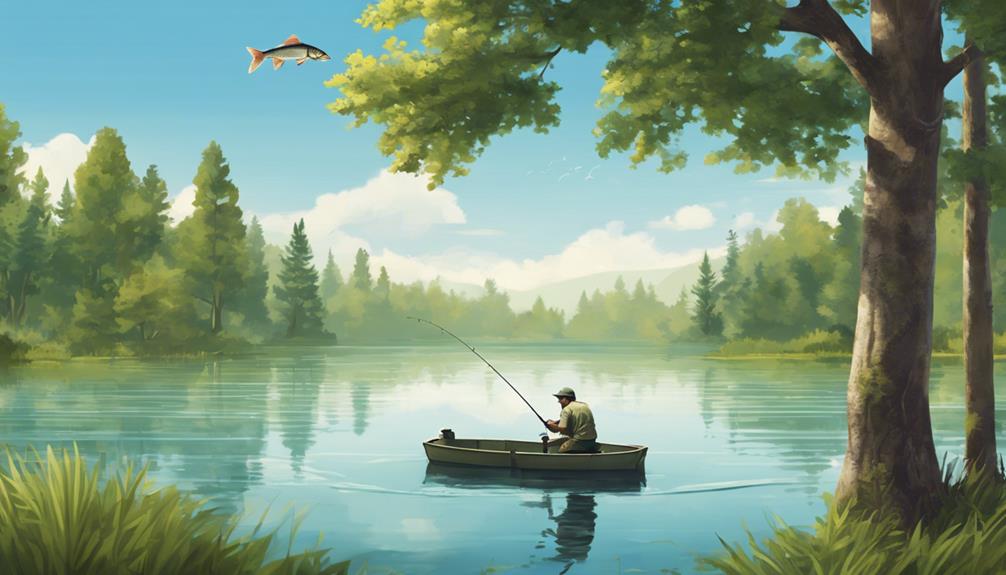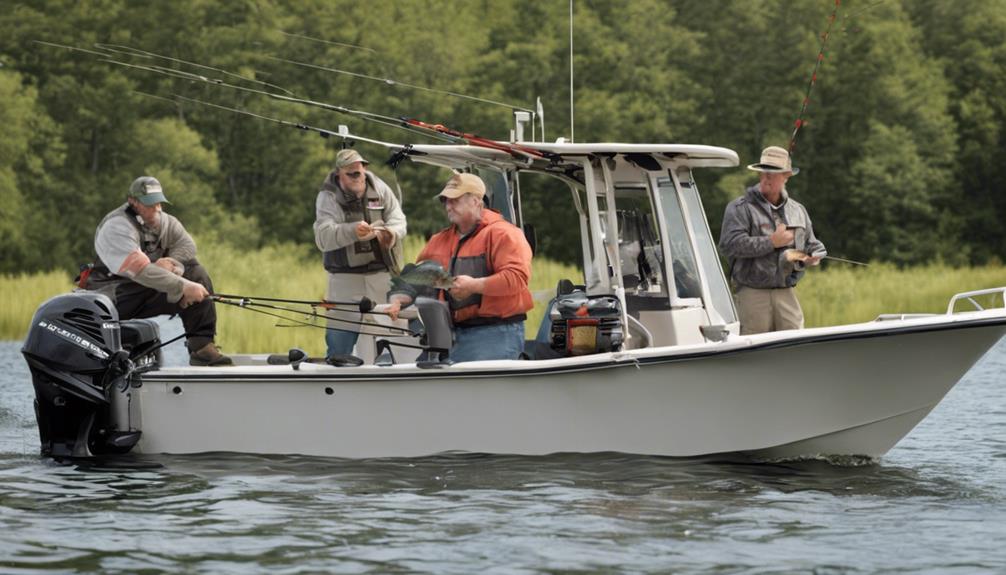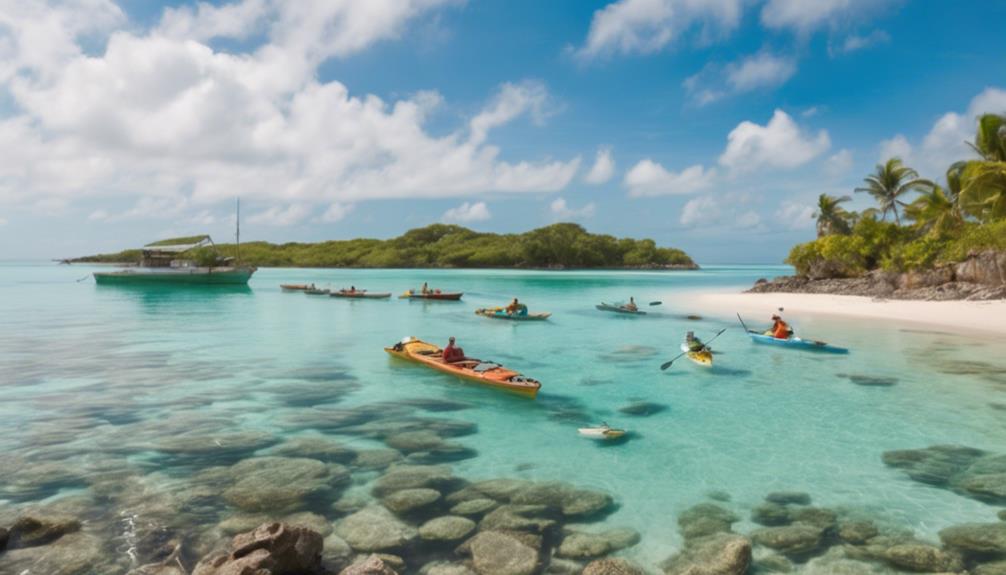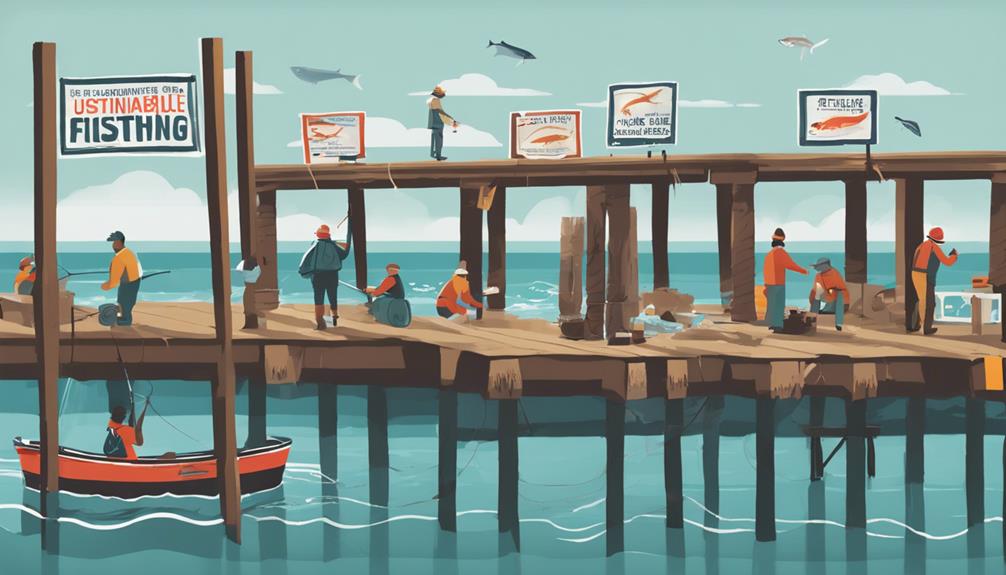To effectively promote freshwater fishing conservation, you must understand the importance of preserving aquatic ecosystems and the delicate balance within them. By implementing catch and release practices, supporting local conservation efforts, and educating fellow anglers, you can make a significant impact on the sustainability of freshwater fish populations.
However, there are more practical steps to consider.
Importance of Freshwater Conservation
Understanding why freshwater conservation matters can lead to more mindful fishing practices. Water quality is a crucial aspect of freshwater conservation. It directly affects the health of aquatic ecosystems and the organisms living within them, including the fish you aim to catch. By ensuring good water quality, you aren't only preserving the habitat but also promoting sustainable fish populations.
Ecosystem preservation is another key reason why freshwater conservation is vital for anglers like yourself. Freshwater ecosystems are incredibly diverse and interconnected. When one species is impacted, it can have a ripple effect throughout the entire ecosystem. By actively participating in conservation efforts, such as reducing pollution and supporting habitat restoration projects, you contribute to the overall health and balance of these ecosystems.
When you prioritize freshwater conservation, you aren't only safeguarding the environment but also securing the future of recreational fishing. Healthy aquatic ecosystems provide better fishing opportunities, ensuring that you can continue enjoying your favorite pastime for years to come. By understanding the importance of water quality and ecosystem preservation, you can make more informed decisions while fishing and actively contribute to the sustainability of freshwater resources.
Understanding Fish Habitat Needs
Ensuring that fish habitat needs are met is essential for promoting healthy aquatic ecosystems and sustainable fish populations. Habitat preservation plays a crucial role in maintaining the balance of freshwater ecosystems and supporting diverse fish populations. Different fish species have specific habitat requirements, such as water depth, temperature, vegetation, and substrate. By understanding these needs, you can contribute to the conservation of fish populations and their habitats.
Ecosystem balance is closely tied to fish habitat preservation. Healthy habitats provide essential resources for fish, including food sources, breeding grounds, and shelter. By protecting and restoring habitats like wetlands, rivers, lakes, and estuaries, you directly support the overall health of fish populations and the surrounding ecosystem. Additionally, maintaining water quality is paramount for fish habitat sustainability. Pollution, sedimentation, and nutrient runoff can degrade water quality, impacting both fish health and habitat viability. You can help preserve water quality by reducing chemical use, properly disposing of waste, and supporting initiatives that aim to improve water management practices.
Implementing Catch and Release Practices
To promote sustainable fishing practices, consider adopting catch and release strategies to help conserve fish populations and preserve aquatic ecosystems. Sustainable angling involves being mindful of the impact of fishing activities on fish populations and their habitats. By practicing catch and release, you can contribute to the responsible harvesting of fish while ensuring their conservation for future generations.
When implementing catch and release practices, it's essential to use barbless hooks to minimize harm to the fish. Barbless hooks are easier to remove, reducing injury and stress to the fish during the release process. Additionally, handling the fish with wet hands or using a wet cloth can help protect their delicate skin and scales.
Proper techniques for catch and release include minimizing the time the fish spends out of the water. Quickly unhook the fish and release it back into the water, allowing it to swim away strong. Avoiding overplaying the fish can prevent exhaustion, making its recovery faster once released.
Educating fellow anglers about the benefits of catch and release can further promote sustainable angling practices. By spreading awareness and encouraging others to participate in responsible harvesting, you can help protect fish populations and support the conservation of freshwater ecosystems.
Supporting Local Conservation Efforts
Consider actively engaging in local conservation efforts to protect and preserve freshwater ecosystems in your community. By supporting local conservation initiatives, you can play a vital role in safeguarding the natural habitats of fish species and promoting sustainable fishing practices. Community involvement is crucial for the success of conservation partnerships that aim to ensure the long-term health of freshwater environments. Through environmental stewardship and habitat restoration projects, you can contribute to the overall well-being of aquatic ecosystems and help maintain a balanced fish population.
Engaging in local conservation efforts provides an opportunity to give back to the environment that supports your fishing activities. By participating in habitat restoration projects such as river clean-ups or wetland preservation activities, you actively contribute to the conservation of freshwater resources. These actions not only benefit the ecosystem but also create a sense of pride and ownership within the community.
Collaborating with local conservation organizations and government agencies allows you to leverage resources and expertise to address conservation challenges effectively. By joining forces with like-minded individuals and groups, you can amplify your impact and drive positive change in your community. Together, through a shared commitment to environmental conservation, we can ensure the sustainability of freshwater ecosystems for future generations.
Educating Anglers on Conservation
As anglers, it's essential to educate ourselves and fellow fishing enthusiasts on conservation practices to protect freshwater ecosystems effectively. Conservation education plays a crucial role in ensuring that our fishing activities don't harm the delicate balance of aquatic environments. By increasing angler awareness about the impact of our actions on the ecosystem, we can work towards sustainable fishing practices that preserve the health of freshwater habitats for future generations.
One way to enhance conservation education among anglers is through workshops and seminars focused on environmental stewardship. These sessions can cover topics such as responsible fishing techniques, catch-and-release best practices, and the importance of minimizing pollution in water bodies. By actively participating in these educational opportunities, you can equip yourself with the knowledge needed to make informed decisions while out on the water.
Additionally, engaging in discussions with fellow anglers about conservation can help spread awareness within the fishing community. Whether it's sharing articles, hosting informal meetups to discuss conservation issues, or simply leading by example during fishing trips, every effort counts towards building a culture of environmental consciousness among anglers.
Participating in Clean-up Initiatives
Get involved in clean-up initiatives to actively contribute to the preservation of freshwater ecosystems. Community involvement is crucial in addressing the environmental impact of trash on water quality. By participating in clean-up efforts, you can make a tangible difference in the health of freshwater habitats where fish thrive.
Trash collection activities organized by local groups or conservation organizations provide opportunities for you to directly impact the cleanliness of rivers, lakes, and streams. Removing litter from these areas not only enhances the visual appeal but also prevents harmful substances from leaching into the water, ultimately benefiting the aquatic life that depends on these ecosystems.
The environmental impact of waste on water quality can't be overstated. Plastics, chemicals, and other pollutants pose a significant threat to the delicate balance of freshwater environments. Through your involvement in clean-up initiatives, you actively contribute to reversing this trend and promoting healthier habitats for fish populations.
Joining forces with like-minded individuals who share a passion for freshwater conservation amplifies the effectiveness of clean-up campaigns. By working together towards a common goal, you create a ripple effect of positive change that extends beyond just picking up trash. Your actions set an example for others and inspire a sense of stewardship for the protection of our precious freshwater resources.
Advocating for Fishing Regulations
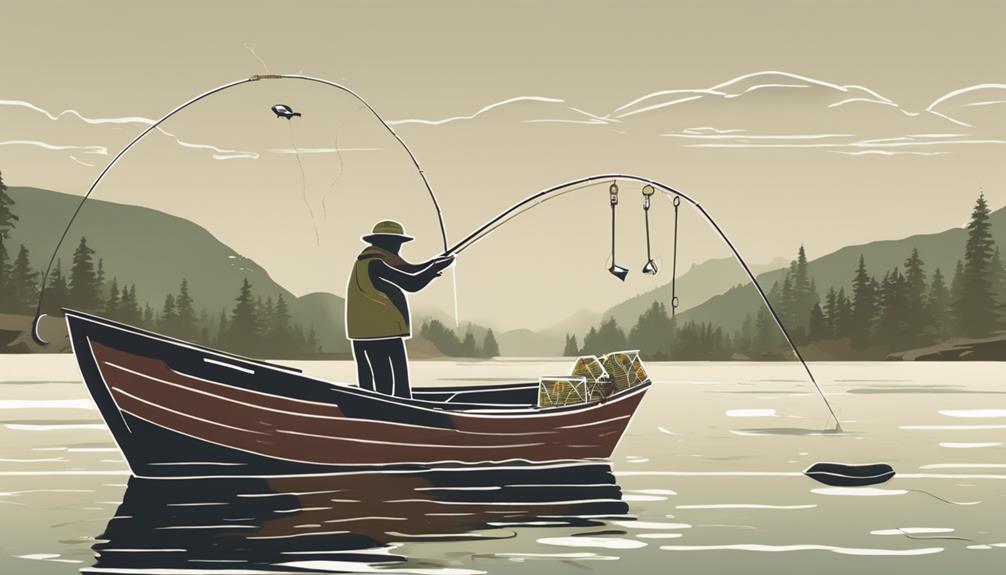
Advocate for necessary fishing regulations to safeguard the sustainability of freshwater fish populations. By raising awareness and lobbying legislators, you can play a crucial role in ensuring the long-term health of aquatic ecosystems.
Here are three key actions you can take to promote fishing regulations effectively:
- Educate the Public: One of the most impactful ways to advocate for fishing regulations is to educate the public about the importance of sustainable fishing practices. By raising awareness about the threats facing freshwater fish populations, such as overfishing and habitat destruction, you can garner support for regulatory measures.
- Engage with Legislators: Lobbying legislators is essential for enacting meaningful fishing regulations. By meeting with policymakers, sharing scientific data, and expressing the urgency of conservation efforts, you can influence the creation and enforcement of laws that protect freshwater fish species.
- Support Conservation Organizations: Joining or supporting conservation organizations dedicated to freshwater fishing conservation can amplify your advocacy efforts. These groups often have established networks, resources, and expertise to drive legislative change and promote sustainable fishing practices effectively.
Engaging in Research and Monitoring
Contribute to the conservation of freshwater fish populations by actively engaging in research and monitoring efforts. By participating in research methods and employing monitoring techniques, you can play a crucial role in safeguarding the delicate balance of aquatic ecosystems.
Research methods are essential for understanding the dynamics of freshwater fish populations. By conducting surveys, tagging studies, and genetic analyses, you can gather valuable data on species distribution, abundance, and genetic diversity. These insights are vital for developing effective conservation strategies and ensuring the long-term sustainability of fish populations.
Monitoring techniques, such as electrofishing, sonar technology, and water quality assessments, allow you to track changes in fish populations and their habitats over time. Regular monitoring helps detect early signs of stress or decline in fish populations, enabling prompt intervention to mitigate potential threats.
Collaborating with local agencies, universities, and conservation organizations can provide access to specialized equipment and expertise, enhancing the quality and scope of your research and monitoring efforts. By sharing your findings with the scientific community and policymakers, you can contribute to evidence-based decision-making and promote informed conservation practices.
Frequently Asked Questions
How Can Anglers Contribute to Freshwater Conservation Beyond Catch and Release Practices?
To go beyond catch and release, anglers can contribute to freshwater conservation by adopting eco-friendly practices. Ensure responsible disposal of fishing gear to protect aquatic habitats.
Participate in habitat restoration projects to enhance fish populations and biodiversity. Support organizations that work towards freshwater conservation efforts.
Are There Specific Local Conservation Efforts That Focus on Freshwater Fishing Conservation?
Local initiatives focused on freshwater fishing conservation often stem from community partnerships. These efforts involve collaborating with local organizations, government agencies, and anglers to protect water quality, fish habitats, and species diversity.
By participating in these initiatives, you can directly contribute to the sustainability of freshwater ecosystems and the preservation of fishing opportunities for future generations.
Get involved in your community's conservation efforts to make a meaningful impact on freshwater fishing conservation.
What Role Do Freshwater Fishing Tournaments Play in Promoting Conservation Efforts?
Freshwater fishing tournaments can have a significant impact on conservation initiatives. They provide a platform for angler engagement and community outreach. By promoting catch-and-release practices, educating participants about sustainable fishing methods, and raising awareness about environmental issues, these tournaments play a crucial role in promoting conservation efforts.
Anglers who participate in these events often become advocates for protecting freshwater ecosystems, contributing to the overall goal of conservation.
How Can Anglers Help Prevent the Spread of Invasive Species in Freshwater Ecosystems?
To prevent the spread of invasive species in freshwater ecosystems, you can take action by learning about invasive species management and spreading awareness through education.
Implement biosecurity measures like cleaning your gear and boat to prevent the transfer of invasive species.
Engage in outreach efforts to educate other anglers about the importance of preventing the spread of invasives.
Your actions can make a significant impact in protecting freshwater ecosystems from the harmful effects of invasive species.
Are There Any Specific Government Policies or Regulations That Support Freshwater Fishing Conservation Efforts?
Government regulations play a crucial role in supporting freshwater fishing conservation efforts. By implementing and enforcing conservation incentives, authorities can help protect fish populations and their habitats. These regulations can include limits on catch size, designated no-fishing zones, and restrictions on certain fishing practices.
Conclusion
By taking practical steps like understanding fish habitat needs, implementing catch and release practices, and supporting local conservation efforts, you can play a crucial role in promoting freshwater fishing conservation.
Educating anglers on conservation, participating in clean-up initiatives, advocating for fishing regulations, and engaging in research and monitoring are all ways to make a positive impact on the health of our freshwater ecosystems.
Every effort counts towards preserving these valuable resources for future generations of anglers to enjoy.
